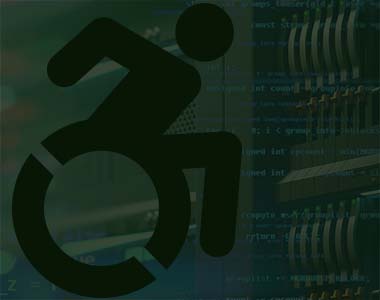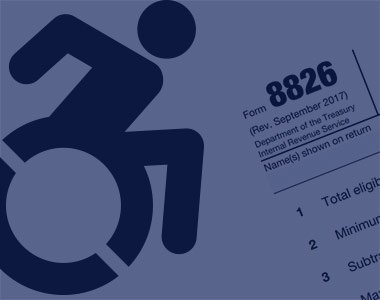U.S. colleges and universities produce a huge quantity of online content every year. This material comes in variety of formats including web pages, documents, course materials, video and multimedia. Ensuring that content is accessible is both a mandate and an important task for content creators, developers and school administration.
In order to help students, staff and faculty meet accessibility requirements, schools commonly recommend a suite of web accessibility testing tools for use when creating content. These tools would be used to check and test websites or webpages in process, or audit previously published content.
With the Section 508 refresh requirements published in January 2017 going into effect January 2018, I was curious what accessibility tools higher education was placing in the hands of content creators and accessibility testers. As you will see certain institutions have more to say on the subject that others.
Please note: the below represents only a small and arbitrary sample based on publicly-available information. Colleges and universities often maintain additional information in protected intranets and student portals. This list may be updated and expanded in the future.
Brown University
Brown University recommends the use common free web accessibility checkers, such as Web Accessibility Evaluation Tool (WAVE), the WAVE Chrome Extension, etc.
Clemson University
Clemson University states it offers HiSoftware’s AccVerify to helps its community evaluate and repair the accessibility of its web pages. Furthermore, the Hi-Caption captioning tool is available for video content. Sounds great except that HiSoftware was bought out by Cryptzone and rolled into their Compliance Sheriff product by 2014. So, Clemson is providing either out of date information or tools.
Duke University
Does not seem to have much to say on the matter publicly other than linking to various generic online resources including the Web Accessibility Evaluation Tool (WAVE).
Harvard University
Siteimprove is best-used for public-facing websites. Reports can be automatically generated. The tool features plugins for popular content management systems.
Accessibility Management Platform (AMP) from the SSB Bart Group (now Level Access) is designed for use with complex, transactional websites and applications. Users schedule tests and reports themselves.
Additional single issue tools include a bevy of contrast checkers, as well as PDF Accessibility Checker and Accessibility View by The Paciello Group, and other miscellaneous tools.
Automated tools for larger sites and projects include:
SortSite Desktop, a paid application (for Windows and Mac OS X) for checking web sites for accessibility issues.
AChecker by Inclusive Design Research Centre. Allows users to create their own guidelines, and author their own accessibility checks.
Tanaguru. An open source website assessment tool, with a focus on accessibility.
University of Maryland
University of Maryland recommends using common tools such as Web Accessibility Evaluation Tool (WAVE), but also a number of screen readers: JAWS, Window-Eyes and NVDA.
NC State University
NC State University recommends several tools for testing individual pages or entire sites:
SortSite by PowerMapper for sites and pages is provided as virtualized software or an installable version.
WAVE Web Accessibility Evaluation Tool and WAVE Chrome Extension for single pages.
They have also created a home-grown accessibility scan tool for internal use that combines information from both WAVE and SortSite.
Penn State University
Summer 2017 Penn State switched from Compliance Sheriff to the Functional Accessibility Evaluator (FAE), a web-based application developed by the University of Illinois.
FAE is available with a companion product, AInspector toolbar for the Firefox browser. For other testing requirements tools such as the WAVE toolbar (Chrome | Firefox) are recommended.
Swarthmore College
I was unable to locate useful information for faculty, staff or students on their public sites, but at least they were hiring students to help remediate their own accessibility issues.
Temple University
Temple recommends the use of paid tool Compliance Sheriff and the free Web Accessibility Evaluation Tool (WAVE) and its related Chrome and Firefox extensions.
University of California
This large state system has a good handle on accessibility and recommends:
Fangs: A Firefox extension displays a textual representation of a web page similar to how it would be read by screen-reading software. It also provides lists of headings and links on the page, which are popular features in screen-reading software. However, this software has not been updated since 2010 and is no longer being actively maintained.
Functional Accessibility Evaluator (FAE): This tool from the University of Illinois – Urbana-Champaign allows the user to enter a URL and get a quick accessibility evaluation of that one page. Users can opt to create a free account to evaluate multiple pages at a time and generate and save reports. FAE 2.0 tests HTML5 and ARIA techniques or HTML 4.
SortSite: The paid tool generates site-wide reports for accessibility, broken links, device compatibility, SEO, privacy, usability, and validation.
Total Validator: Total Validator Basic tool is a free desktop testing tool for individual web developers to test single web pages. The Pro tool, which costs $40 per license, can report on entire websites. Total Validator is also available as an online testing resource and Firefox and Chrome browser extensions.
Web Accessibility Evaluation Tool (WAVE): WAVE’s toolbar version provides a mechanism for running WAVE reports directly within Firefox and Chrome.
Some campuses may also have (or had) access to SSB Bart Group Accessibility Management Platform (AMP) for automated testing. SSB Bart Group is now Level Access.
University of Iowa
University of Iowa was ranked no. 1 in web accessibility in late 2016, so you might expect them to have a robust testing and compliance program.
Their general recommendation is to use Functional Accessibility Evaluator (FAE).
However, Compliance Sheriff also appears to the be default enterprise accessibility tester adopted for general use.
University of Pennsylvania
The University of Pennsylvania offers some slim advice including the use of WAVE and Cynthia Says, the free WCAG 2.0 and Section 508 scanner powered by Cryptzone (which develops Compliance Sheriff, a paid tool).
University of Pittsburgh
Pitt recommends the ubiquitous Web Accessibility Evaluation Tool (WAVE). They also provide access to JAWS, MAGic and Kurzweil software in campus computer labs that could be used for testing.
University of Washington
Instead of adopting or recommending a set testing regimen, The University of Washington recommends a series of accessibility testing tools:
Total Validator, a standalone tool for Windows, Mac OS and Linux that provides contrast checking and accessibility validation along with HTML validation and other checks.
Functional Accessibility Evaluator (FAE)
WAVE Web Accessibility Evaluation Tool (WAVE)
AChecker, the single page checker.
Williams College
Unable to locate one piece of useful information on their public-facing websites. Hmm.




